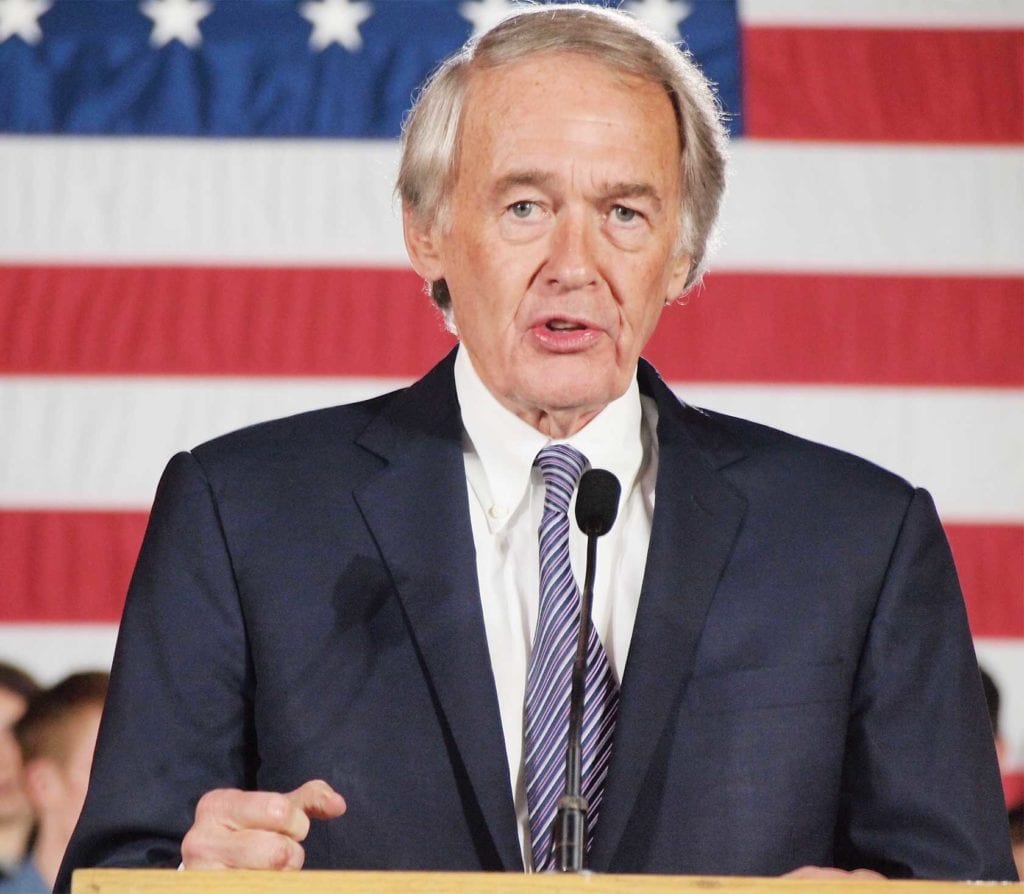Senators seek end to qualified immunity
Legal doctrine protects cops from prosecution for acts of misconduct

In response to nationwide protests sparked by George Floyd’s murder, U.S. Sens. Ed Markey, Kamala Harris and Cory Booker have introduced a resolution abolishing qualified immunity, a legal doctrine that shields officers from certain lawsuits. Markey advocated for the resolution during a June 3 press conference and called for the end of centuries of police violence against communities of color.
“If we want to change the culture of police violence against black and brown men and women, then we need to start holding accountable the officers who abuse their positions of trust and responsibility in our communities,” he said. “That means abolishing the dangerous judicial doctrine known as qualified immunity.”
Qualified immunity protects law enforcement officers from being sued in their personal capacity and being held personally liable for their abuses, noted Markey. Victims and their families can only sue police officers if the officer’s action violates “clearly established” rights.
“For decades, law enforcement has relied on qualified immunity to shield officers from accountability in instances of police brutality and excessive force,” said Markey.
He noted that Congress never actually endorsed the doctrine and that qualified immunity “completely contravenes federal law.” In the Civil Rights Act of 1871, Congress allowed individuals to sue public officials. In the century-and-a-half since, said Markey, the Supreme Court has “gutted this landmark act” and created and expanded qualified immunity instead.
“Qualified immunity effectively immunizes law enforcement officers from civil suits,” he said. “That is because the Supreme Court has concocted a nearly impossible standard that victims must meet to even have a chance at seeking justice.”
Many victims are disincentivized to sue officers because their lawsuit must bypass qualified immunity. To win the lawsuit, a victim must find a prior case in which the courts have deemed the challenged use of force to be illegal, noted Markey. The cases must be in the same jurisdiction, with the same facts, contacts and conduct. Even the smallest distinction within the cases may result in a dismissal.
“It is an insidious Catch-22 set up to be rigged against the victim,” he said, noting that the law makes it “almost impossible” for victims of excessive force to hold officers accountable.
Disproportionate effect
Qualified immunity affects people of color disproportionately because they are disproportionately victims of excess force at the hands of law enforcement, noted Markey. He cited a study from the National Academy of Sciences that found black men two-and-a-half times more likely than white men to be killed by law enforcement. Over the course of their lives, one in every 1,000 black men will die at the hands of police, he added. Time Magazine recently reported that black individuals are killed by police at a rate of more than one every other day. Countless stories remain untold, and countless officers remain uncharged.
“In our culture of systemic racism, qualified immunity is one of the foremost tools of oppression,” said Markey.
Suffolk District Attorney Rachael Rollins said that she stood in full support of the resolution. She added that for too long, district attorneys have ignored officers committing criminal acts resulting in “broken bones, broken spirits and death.”
She later acknowledged the death of 26-year-old Breonna Taylor, an emergency medical technician shot and killed by officers on March 13. Officers stormed her Louisville apartment without a warrant, using a battering ram to break open the doors. After the break-in, they returned shots from Taylor’s boyfriend and struck Taylor more than eight times. The officers have not been charged.
Not just a few ‘bad apples’
Rahsaan Hall, director of the Racial Justice Program for the American Civil Liberties Union (ACLU), recognized the number of deaths just like Taylor’s.
“The injustices that we have seen recently are not isolated incidents,” said Hall. “They are embers from a flame that must be extinguished.”
Hall said that police injustice does not just refer to a few “bad apples.” He said that officers are granted too much immunity and are too protected from liability. The way that black communities have been policed is “unacceptable and unconscionable.”
Michael Curry, former president of Boston’s NAACP branch, said that people are tired of being “weathered to injustice.”
“We’re now demanding that there be no more Tamir Rices, Eric Garners and George Floyds,” he said.
He urged advocates to step up and initiate change and repeated the NAACP’s mantra, coined by a former chairman: “Courage will not skip this generation.”
“We’ll see if courage exists in the rest of the Senate with some of [Markey’s] Republican colleagues and those in The House,” Curry said.
Markey said he was hopeful that something has touched the conscience of Republicans.
“Senator Booker and Senator Harris and I have introduced the resolution, and we are going to now work to get support for that resolution,” he told the Banner. “I think we will be able to get substantial support.”
Markey is now working to draft the legislation.
“It is long past time to dismantle the oppressive use of abusers in law enforcement,” he said. “We cannot allow this judge-made doctrine to perpetuate the violence of communities of color any longer.”
Protests sparked by Floyd’s death have spread to all 50 states. Millions of protesters have taken to the streets and call for an end to police brutality.
“It’s not only the buildings that are smoldering — the soul of America is on fire,” said Markey. “Until we can confront systemic racism, our country will never stop burning.”






